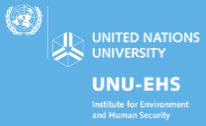The UN University Institute for Environment and Human Security (UNU-EHS) released a report titled ‘Climate Change, Water Conflicts and Human Security: Regional Assessment and Policy Guidelines for the Mediterranean, Middle East and Sahel,' which examines whether climate change undermines human security by intensifying water hazards, such as droughts, floods and water scarcity.
The report also assesses vulnerability in relation to climate change-related hazards.
 2 September 2013: The UN University Institute for Environment and Human Security (UNU-EHS) released a report, titled ‘Climate Change, Water Conflicts and Human Security: Regional Assessment and Policy Guidelines for the Mediterranean, Middle East and Sahel,’ which examines whether climate change undermines human security by intensifying water hazards, such as droughts, floods and water scarcity. The report also assesses vulnerability in relation to climate change-related hazards.
2 September 2013: The UN University Institute for Environment and Human Security (UNU-EHS) released a report, titled ‘Climate Change, Water Conflicts and Human Security: Regional Assessment and Policy Guidelines for the Mediterranean, Middle East and Sahel,’ which examines whether climate change undermines human security by intensifying water hazards, such as droughts, floods and water scarcity. The report also assesses vulnerability in relation to climate change-related hazards.
The report concludes that climate, hydrological, institutional, political and socioeconomic factors contribute to human insecurity by exacerbating intra- and inter-State conflicts and social tensions. It highlights stronger links between water-related conflicts and political and socioeconomic factors than between water conflicts and climatic factors. While the report identifies democracy and good institutions as the most important variables, it cautions that the importance of each factor is context-specific.
The report emphasizes that adaptation processes influence the effects of climate change on human security. It recommends a normative adaptive framework for all actors and assessing which human security aspects can and should be traded for others.
Policymakers can improve adaptive capacity, reduce vulnerabilities and increase human security, according to the report. It recommends, inter alia: promoting and strengthening institutional accountability and functioning; strengthening civil protection and social security systems; improving capacity to implement policies; developing conflict resolution mechanisms; supporting flexible policy cycles, including early warning systems; and mainstreaming climate change adaptation and disaster risk reduction (DRR).
The report is the result of collaboration among UNU-EHS and 13 international research teams, as part of the Climate Change, Hydro-conflicts and Human Security (CLICO) project. [UNU Press Release] [Publication: Climate Change, Water Conflicts and Human Security: Regional Assessment and Policy Guidelines for the Mediterranean, Middle East and Sahel]